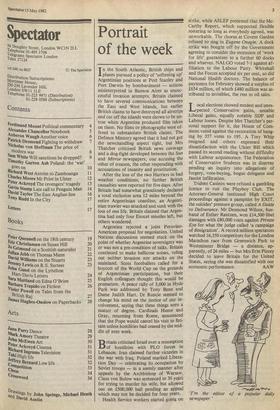Portrait of the week
In the South Atlantic, British ships and planes pursued a policy of 'softening up' Argentinian positions at Port Stanley and Port Darwin by bombardment — actions misinterpreted in Buenos Aires as unsuc- cessful invasion attempts. Britain claimed to have severed communications between the East and West islands, but earlier British claims to have destroyed all airstrips land cut off the islands were shown to be un- true when Argentina produced film taken on them. No films or photographs were of- fered to substantiate British claims. The Defence Ministry agreed that it had not got the newshandling aspect right, but Mrs Thatcher criticised British news coverage and a dog-fight developed between the Sun and Mirror newspapers, one accusing the other of treason, the other responding with accusations of insanity and prostitution.
After the loss of the two Harriers in bad weather conditions, no further British casualties were reported for five days. After Britain had somewhat grandiosely declared a total exclusion area 12 miles beyond the entire Argentinian coastline, an Argenti- nian trawler was attacked and sunk with the loss of one life. Britain claimed that Argen- tina had only four Exocet missiles left, but others wondered.
Argentina rejected a joint Peruvian- American proposal for negotiation. United Nations discussions seemed stuck on the point of whether Argentine sovereignty was or was not a pre-condition of talks. Britain continued to make bellicose noises, ruling out neither invasion nor attacks on the mainland. Scots footballers called for a boycott of the World Cup on the grounds of Argentinian participation, but their English colleagues thought this would be premature. A peace rally of 3,000 in Hyde Park was addressed by Tony Benn and Dame Judith Hart. Dr Runcie seemed to change his mind on the justice of our in- volvement, saying that these things were a matter of degree. Cardinals Hume and Gray, returning from Rome, announced that the Pope would cancel his visit to Bri- tain unless hostilities had ceased by the mid- dle of next week.
Britain criticised Israel over a resumption of hostilities with PLO forces in Lebanon. Iran claimed further victories in the war with Iraq. Poland marked Libera- tion Day — celebrating its occupation by Soviet troops — in a seemly manner after appeals by the Archbishop of Warsaw. Claus von Bulow was sentenced to 30 years for trying to murder his wife, but allowed out on £500,000 bail pending an appeal which may not be decided for four years.
Health Service workers started going on
strike, while ASLEF protested that the Mc- Carthy Report, which supported flexible rostering so long as everybody agreed, was unworkable. The chorus at Covent Garden refused to sing in Eugene Onegin. A dock strike was bought off by the Government agreeing to consider the extension of 'work for life' guarantees to a further 60 docks and wharves. NALGO voted 7-1 against af- filiation to the Labour Party. Whitehall and the Forces accepted six per cent, so did National Health doctors. The balance of payments for February showed a surplus of £654 million, of which £480 million was at- tributed to invisibles, the rest to oil sales.
Local elections showed modest and unex- pected Conservative gains, notable Liberal gains, equally notable SDP and Labour losses. Despite Mrs Thatcher's per- sonal support for it, the House of Com- mons voted against the restoration of hang- ing by 357 votes to 195. A Tory Whip resigned and others expressed their dissatisfaction with the Ulster Bill which passed its second reading without difficulty with Labour acquiescence. The Federation of Conservative Students was in disarray pending an inquiry into allegations of forgery, vote-buying, bogus delegates and fascist infiltration.
Trident Casinos were refused a gambling licence to run the Playboy Club. The Attorney-General instituted High Court proceedings against a pamphlet by EXIT, the suicides' pressure group, called A Guide to Deliverance. Mr Desmond Wilcox, hus- band of Esther Rantzen, won £14,500 libel damages with £80,000 costs against Private Eye for what the judge called 'a campaign of denigration'. A record million spectators watched 16,350 competitors for the London Marathon race from Greenwich Park to Westminster Bridge — a distance, ap- parently, of 26 miles — but Mrs Erin Pizzey decided to leave Britain for the United States, saying she was dissatisfied with our
economic performance. AAW
'I'm the editor of a popular daily newspaper.'






































 Previous page
Previous page